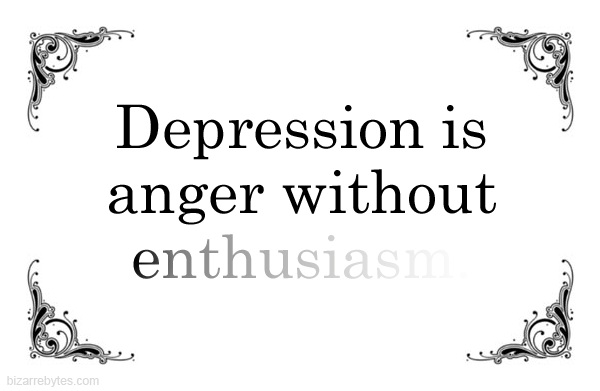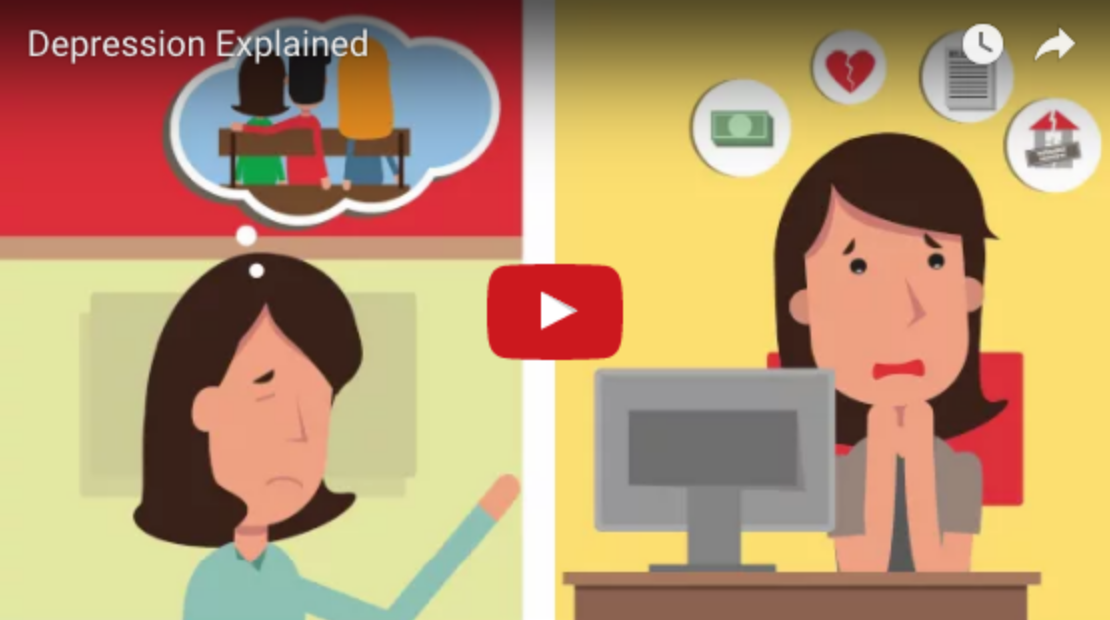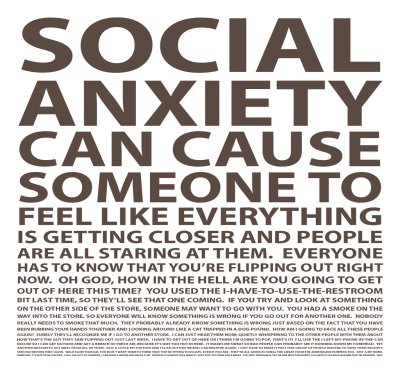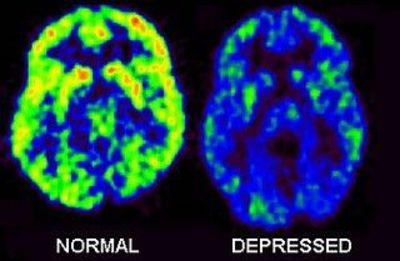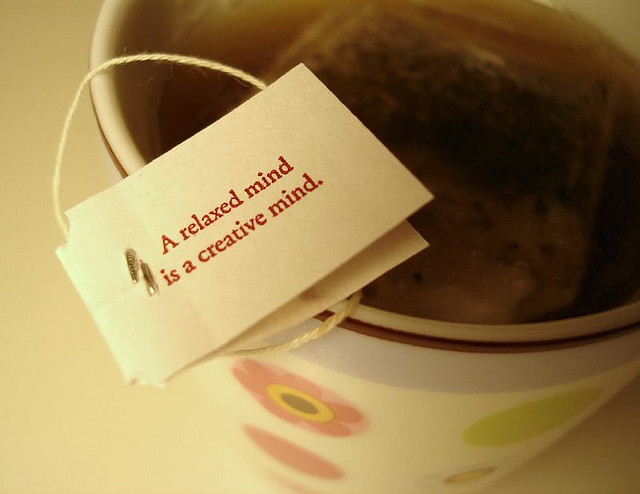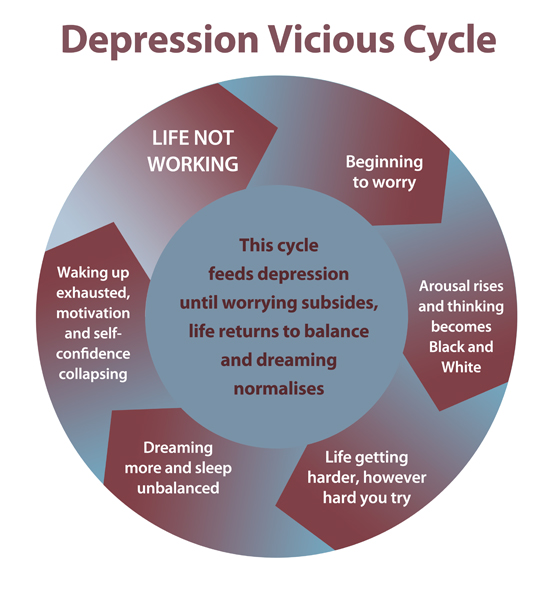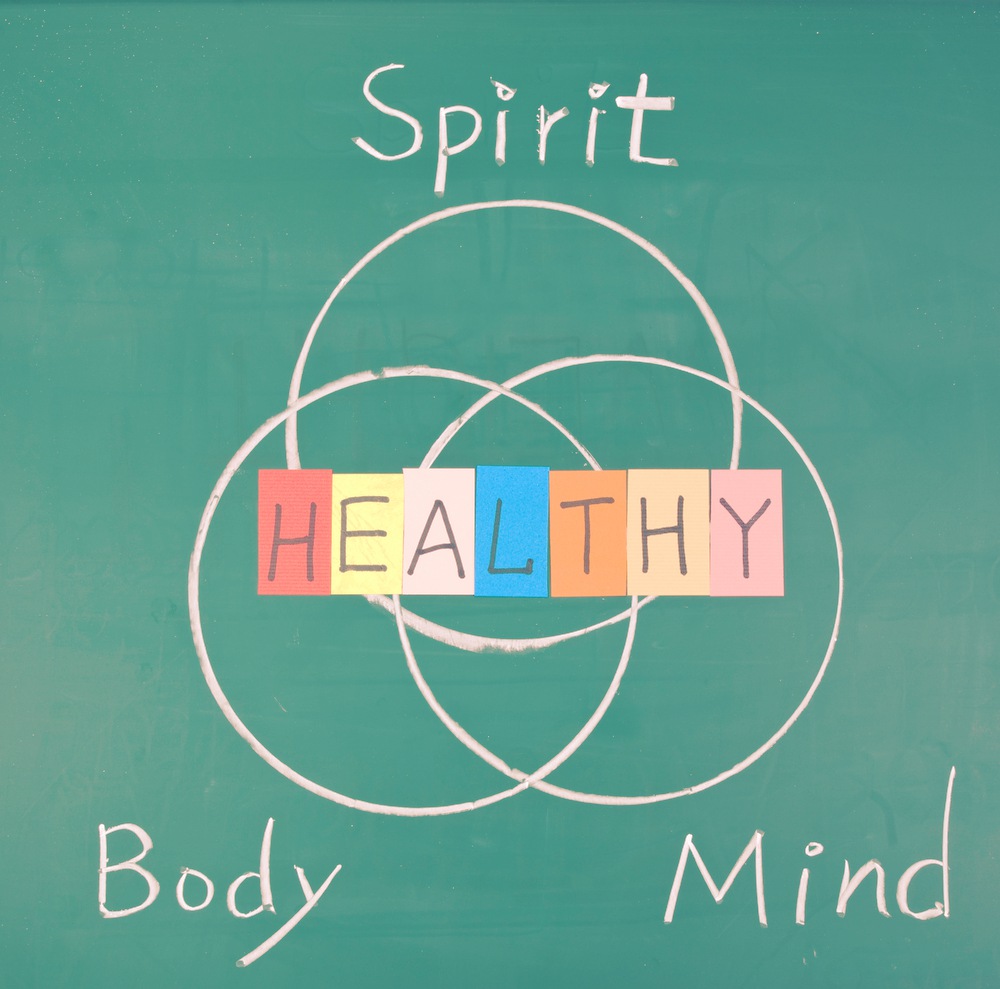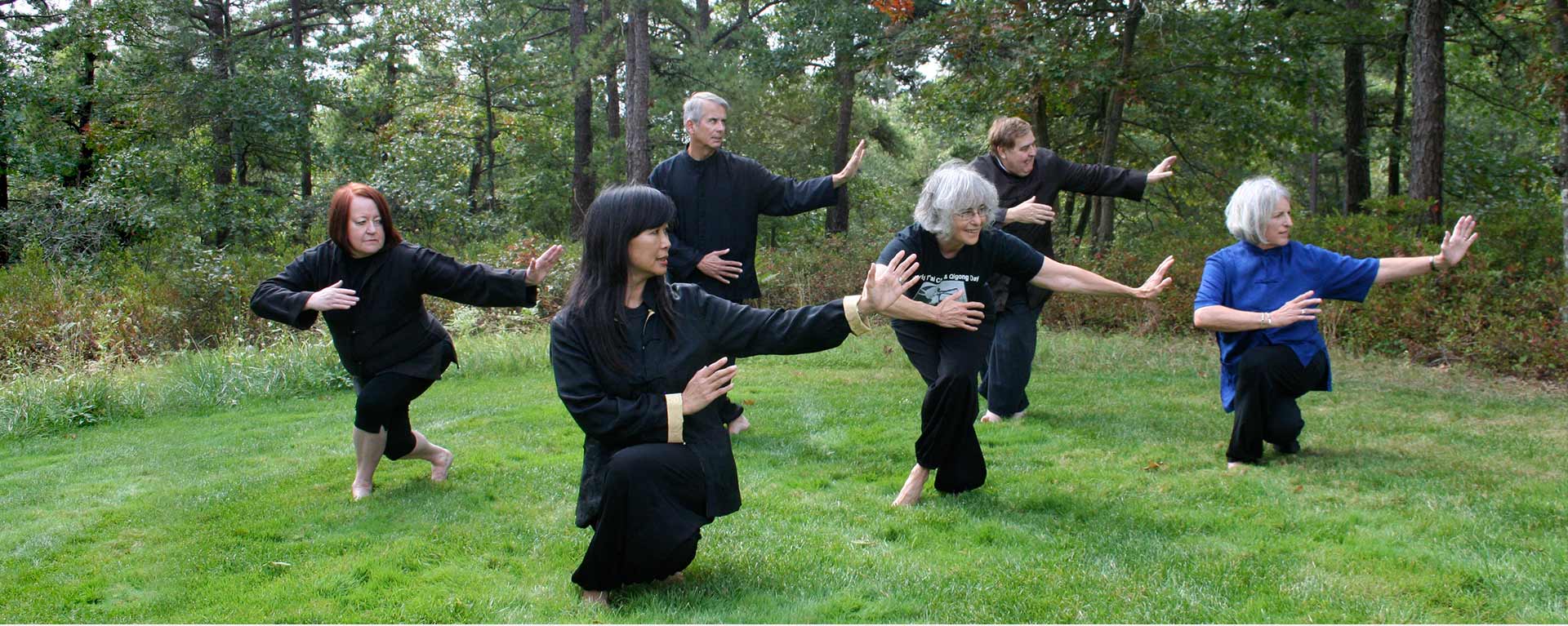Anxiety and Depression and Anger...Oh, My!
Let's think about anxiety and depression...and anger:
- When do you get angry?
- When do you get sad?
- When do you get anxious?
So, "Why am I depressed?", "Why am I anxious?", "Why am I angry?" The common theme with anxiety and depression is that there's a perception of something or someone being out of our control If we felt in control at all moments, we'd never experience these emotions.
Our bodies respond very
similarly when our mind becomes anxious, sad, or angry. The real
difference among these three emotions is our internal messaging. That's
why they seem so different. You can think of depression as anger turned
inward.
|
So, when does stress become anxiety? When does sadness become depression? There are two main factors to look for in determining whether or not this is anxiety and depression: 1. How long have you felt stressed or sad? 2. How bad is it? |
Everyone feels sad or blue sometimes. Everyone gets stressed out sometimes. It’s a natural part of life. But, when the sadness and worry persist and interfere with everyday life, it may be anxiety and depression.
Depression Explained: A Short Video
Anxiety and Depression:
To Diagnose or Not to Diagnose?
- Classified according to the DSM-5.
- Each version of the DSM gives us a greater understanding of mental conditions, including anxiety and depression.
Pros
Gives us a common language.
Allows people to learn and get support about their condition or problems.
Cons
Being “labeled” may carry a stigma. (Perhaps stigma is the true problem?)
People
may misuse a diagnosis of anxiety and depression to avoid
responsibility for a problem. “Depression is the leading cause of
disability among nonfatal medical conditions in the United States.” Beth
Laurence, JD
Here are the official diagnoses for the anxiety and depression disorders. Again, keep in mind these are all variations on a theme - the perception of something being out of our control. It's important to not pigeon hole yourself or anyone else in any one category. Each person's experience with anxiety and depression is unique.
Depressive Disorders in the DSM-5: An Umbrella
- Major Depressive Disorder (Bereavement exclusion is no longer in place)
- Persistent Depressive Disorder
- Depressive Disorder due to another medical condition
- Premenstrual Dysphoric Disorder
- Disruptive Mood Dysregulation Disorder (DMDD) (first diagnosis between ages 6 and 18)
Anxiety Disorders in the DSM-5: An Umbrella
- Separation Anxiety Disorder
- Selective Mutism
- Specific Phobia
- Social Anxiety Disorder (Social Phobia)
- Panic Disorder Panic Attack (Specifier)
- Agoraphobia
- Generalized Anxiety Disorder
- Substance/Medication-Induced Anxiety Disorder
- Anxiety Disorder Due to Another Medical Condition
- Other Specified Anxiety Disorder
- Unspecified Anxiety Disorder
Diagnoses Related to Anxiety in the DSM-5: Trauma- and Stressor-Related Disorders
- Reactive Attachment Disorder
- Disinhibited Social Engagement Disorder
- Post-traumatic Stress Disorder
- Acute Stress Disorder
- Adjustment Disorders
- Other Specified Trauma- and Stressor-Related Disorder
- Unspecified Trauma- and Stressor-Related Disorder
Diagnoses Related to Anxiety in the DSM-5:
Obsessive-Compulsive and Related Disorders
- Obsessive-Compulsive Disorder
- Body Dysmorphic Disorder
- Hoarding Disorder
- Trichotillomania (Hair-Pulling Disorder)
- Excoriation (Skin-Picking) Disorder
- Substance/Medication-Induced Obsessive-Compulsive and Related Disorder
- Obsessive-Compulsive and Related Disorder Due to Another Medical Condition
- Other Specified Obsessive-Compulsive and Related Disorder
- Unspecified Obsessive-Compulsive and Related Disorder
Diagnoses Related to Anxiety in the DSM-5:
Somatic Symptom and Related Disorders
- Illness Anxiety Disorder
Symptoms of Depression
SIG E CAPS: The daily presence of five or more of the following symptoms, lasting at least two weeks, indicates that the person is suffering from a depressive disorder.
S: Sleep disturbance
I: Interest decreased in activities that used to be enjoyed
G: Guilt feelings and/or feelings of worthlessness
E: Energy lower than usual
C: Concentration poor
A: Appetite changes (usually loss of appetite and weight loss in the elderly. Complaints of poor digestion or constipation.)
P: Psychomotor changes (agitation or slowing)
S: Suicidal ideation
Clues that someone has anxiety and depression
- Stooped posture
- Slowed speech and movement
- Lack of interest in self care
- Aggressive behavior
- Unrealistic fears
- Repetitive verbalizations (calling for help)
- Agitated shouting, yelling, screaming
- Repeated questions, health related concerns
Common Symptoms of Anxiety
- Rapid heart beat, pounding heart
- Sweating
- Trembling or shaking
- Shortness of Breath
- Dry mouth or feeling of choking
- Chest pain
- Nausea
- Cold chills, hot flashes
- Dizziness
- Feeling detached from oneself
- Numbness, tingling sensation
- Visual changes (light seems too bright, spots)
- Blushing
- Muscle tension, twitching
- Mind going blank
- Difficulty sleeping
- Disturbing dreams
- Unwanted thoughts
- Feeling urge to escape
Anxiety and Depression: Untreated
Can lead to conditions such as:
Heart disease
Diabetes
Stroke
Irritable bowel syndrome
Eczema/Psoriasis
The list goes on and on…
Can make conditions worse:
Longer healing times from injury
Suppressed immunity = more colds, etc.
Can lead to suicide
Brain Effects: There is less neural activity in a depressed brain…
Insights on effective treatment
My colleague, Andrew Richardson sheds some light on the essentials for the treatment of anxiety and depression in these excerpt from his articles.
Talking about your problems is the last thing for depression recovery
If you are full to bursting, then it makes sense begin talking and to let it all out . Who could argue with that? If you are depressed and your head is going round and round with all kinds of theories and explanations as to why you are feeling so bad and if you have urgent problems to sort out – money worries, jobs, relationships etc. etc. – then surely you need to talk to someone about it and quickly too? It seems so obvious doesn’t it? That you should talk to friends or family or even horror of horrors to one of the legion of counselors out there who are trained to listen.
Talking is the last thing depressed people should do
It
is really very simple and follows as night follows day from
understanding what a depression is. A depression is the exhaustion
caused by worrying and ruminating too much. Depression is an exhausted
brain that is dreaming too much in a failing attempt to clear all of the
exhaustion and over worrying.
Depression people are trapped in
their thoughts and emotions and quite naturally they want to begin
talking – to unload to any who might listen. But this will only give
short-term relief and could in fact just feed the rumination as fuel
feeds a flame. Yes there will be real problems to sort out – but before
even attempting to sort them out, your head needs to be in a much
better shape.
why recovery from depression need be no harder than
from a twisted ankle. Imagine someone who twisted their ankle and,
being desperately concerned that she might never walk again, keeps
walking and walking, even though this was making her ankle even worse.
What would you say to her? It would surely be to say to her that she
should rest it and to only begin walking again when the ankle was
stronger. The same applies to depression. Calm you mind, worry less
and only tackle your problems when your mind is fitter.
Practical Firefighting for Depression: Self Help
Set your alarm.
During tiring times like this, using an
alarm clock can be most helpful. Set your alarm in the morning so you
don’t end up staying in bed all day long. If you have an important
meeting to attend, or an appointment, set your alarm as well. A constant
reminder of your daily tasks can keep you motivated to do what you have
to do.
Dress up.
Take a long, cold shower, brush
your teeth, apply makeup, and wear a pretty dress. Even if you just work
from home, dress up! Doing this decreases your urge to lounge because
again, you are reinforcing in your brain that you are getting ready for
something.
Move around.
Sweating it out is one way
to boost your motivation and get your body going. Choose an exercise
that works for you. You don’t have to force yourself to do an intense
workout. You simply go with walking, swimming, running, or gardening.
Schedule your tasks/activities.
Schedule
your tasks according to your energy levels. If you think you have more
energy in the morning, you may want to do tougher jobs and reserve the
lighter ones in the afternoon. For bigger projects, consider creating a
timeline of at least one or two weeks (more if necessary). Break a big
task to smaller ones. And don’t forget to incorporate activities that
give you pleasure, such as your hobbies and passion.
Connect with people you love.
Being
with people you love, including your friends and family is one way to
boost your mood. And when you’re feeling good, you are more likely to
motivate yourself to hit your daily goals. Remember that the more you
remove yourself from the environment of depression, the better your
chance of recovery.
Go out.
Leaving the house can be
one of the most difficult challenges people with depression face. One
reason for this is not having a place to go. When your depressed, even
the most entertaining places can be boring and less amusing. But you
don’t have to be somewhere far, different or extraordinary to reap the
benefit of going out. Just take a short walk around the neighborhood or
invite a friend for a cup of coffee, go to the mall and shop, or walk
your dog in the park.
Consider residential treatment centers.
If depression becomes overwhelming and other forms of coping have proven ineffective, getting help at a residential treatment center could be beneficial. These centers provide a structured environment in which people can dedicate themselves exclusively to recovery. With access to professional mental health specialists, personalized care plans, therapeutic activities, and supportive communities, these centers can be an invaluable source of healing support.
…Or consider an outpatient treatment program.
An alternative form of therapy is outpatient treatment, which does not involve staying overnight at a treatment centre. The likes of an IOP (individualized outpatient program) can be flexibly worked around your lifestyle - which could include commitments like work, education or childcare. Some people find this much more practical than an inpatient program.
Depression Symptoms - The Cycle of Depression
This is what happens when depression symptoms and signs of depression takes hold?
• Something happens in your life that pushes you off balance... and
you quite naturally and healthily begin to worry about it, looking for a
solution that will calm you and bring you back to equilibrium.
• But this does not happen and as the problem persists, it becomes
harder and harder to deal with. And you are aware of those rigid
thinking habits that arise whenever you are under pressure and maybe
also the emotion of bad past memories - and as these impose themselves,
it is even more difficult to get your life back on track.
• Then you’re sleeping begins to deteriorate and in particular you
are increasingly tired and exhausted in the morning when you wake up.
You may also be dimly aware that you are dreaming much more.
A downward spiral really gets underway - the classic depression symptoms...
• Your problems become harder and harder to deal with and seem to be
multiplying and as motivation and energy disappear, you worry more and
more, introspecting and blaming yourself.
What is happening is you
are locking into a depression trance, focusing internally and
negatively, losing hope and as good deep wave sleep becomes pushed out
by excessive dreaming, you may finally be finding that physical aches
and pains add to your sense of hopelessness and "stuckness" - another of
the signs of depression.
This used to be called a state of
nervous exhaustion and you can see why. If very severe, this can even
transmute into psychotic experiences.
This is depression symptoms formulated as a simple depression cycle.
-The simple explanation of depression symptoms
Depression
is the mental and physical exhaustion caused by the body’s need to
dream more than it is capable of, in order to deal with a situation that
appears increasingly impossible.
And why is there the need to engage
in high energy dreaming? It is the attempt to clear the excessive
levels of arousal, worrying and exhaustion, which caused the problem in
the first place.
And so we have a self-feeding vicious circle where symptoms and signs of depression multiply.
Depression Symptoms - what you will read from pretty well all sources:
You
can read many lists of depression symptoms and indeed for many lists,
this is all they offer as they have no coherent explanation. Such as:
• Feeling miserable and sad, being exhausted, finding the smallest tasks impossible
• Losing any sense of enjoyment
• Feeling a failure, guilty and a burden and that life is not worth living or passing you by
• Avoiding people, losing self confidence
• Being tense and irritable all the time
• Having difficulty sleeping, dreaming all night long
• Enduring physical aches and pains which appear to have no physical cause.
It is easy to see how these symptoms fit into the explanation above.
Common misconceptions about Depression symptoms
Depression symptoms are caused by a chemical imbalance.
Low
serotonin is the result not the cause of depression – and this is why
anti-depressants are rarely the answer. Anti-depressants treat symptoms
and not underlying causes and seem to work by suppressing REM (or dream)
sleep.
Depression symptoms are hereditary
The fact
that family members may all suffer from depression is better explained
by their common environments than their common genes. That it is learned
– in terms of thinking styles and coping mechanisms.
Depression symptoms reflect a disease
It is not a biological disorder – there is no chemical test available or possible or yet devised that can mark a depression.
• How else but through environmental factors can the tenfold
increase in depression symptoms amongst those born after 1945 be
explained? Surely, it is that society has changed – family breakdown,
greater materialism and focus on self, a reduced sense of obligation and
duty, an increasing dependence on the state – how is that for starters
as the environmental factors that create worry and dis-empowerment – all
of which make it more difficult to get our essential human needs met.
Everyone needs a healthy body, mind, spirit
Body (Physical, Biological Self)
Mind (Psychological, Emotional Self)
Spirit (Spiritual Self)
Note: Overlap, e.g. psychological interventions can cause biological changes, and vice versa
Body
Ensure healthy amounts of
Sleep
Diet/nutrition
Exercise
Individual exercise
Group / social exercise
Yoga / Martial Arts
Sunlight (especially in the case of winter depression)
Medications may be a helpful “body” or physical intervention in certain circumstances.
For anxiety and depression, in general:
Non-medication strategies are tried first.
Medications are used if non-medication strategies are unsuccessful.
Common types of “self-medication” - some good, some not so good!
Sweets, carbohydrates, chocolates
May possibly be a way of getting serotonin
Exercise
May be a way of getting adrenaline/dopamine to cope with anxiety and depression
Caffeine
May be a way of getting adrenaline/dopamine
Street drugs
Mind
Hypnotherapy can help calm the mind and visualize positive outcomes.
Psychotherapy such as cognitive behavior therapy
Anxiety and depression is caused by cognitive distortions.
Fixing cognitive distortions will overcome the anxiety or depression.
Ensure good coping strategies and ways to deal with stress.
Relaxation techniques
Reframing thoughts
Spirit
Figure out what gives meaning to your life.
Ensure those things are in the your life.
If you're not sure what gives you meaning, try exploring new activities. You're bound to find something to pique your interest.
Overcome emotional insecurity - YOU are enough!
How to Make Your Mind Still: A Quick Exercise
Take a moment to gain control of anxiety and depression with this simple exercise. If you think of your body as a house, most of us spend the majority of our time living right under the roof, in the attic.
We identify ourselves as our thoughts and emotions, our anxiety and depression, letting the constant “mind chatter” take over.
An
easy way to slow down the mind chatter is by bringing your attention to
the rest of your body. Start by taking in some deep breaths. Simply
notice your breath. It’s nearly impossible to pay attention to anything
else when you’re breathing in this mindful way.
Realize that
you are not your thoughts or emotions. You are not anxiety and
depression. You are this awareness or mindfulness behind them. When you
practice mindfulness, it becomes easier to be an observer of your
thoughts, rather than a follower.
